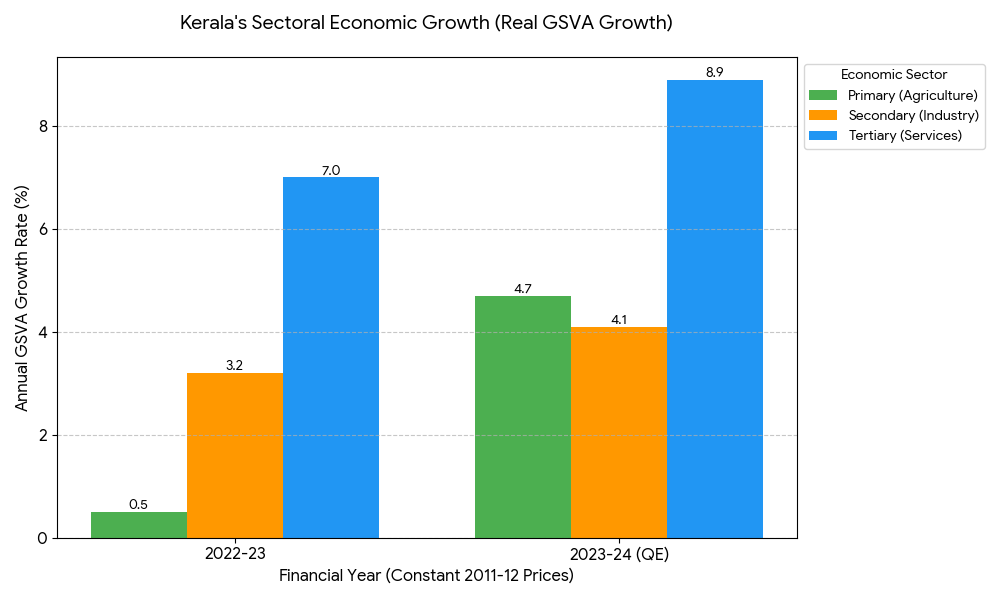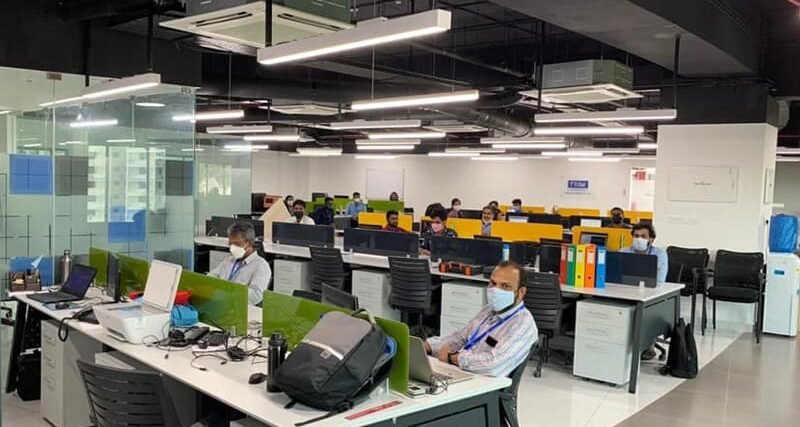- Home
- Businesses
Agriculture
Architects & Designers
Art & Culture
Automobile
Beauty & Spa
Builders & Developers
Community
Eat Outs
Education
Electronics
Employment
Entertainments
Events & Weddings
Finance/Banking
Food/Grocery
Government
Healthcare
Home Service
Hotels & Resorts
Industrial
Interior / Furnishing
IT Services
Media
Miscellaneous
Non-Profit
Overseas Traders
Professional Services
Real Estate
Shopping
Sports
Tours & Travels
Transportation
- City Buzz
Automative -Sale
Real Estate -Sale
Market Place -Sale
Job Vacancies
Professionals
Events
- Offers Around
- Shop
- Stories
Kerala’s Industrial and Business Growth: A Transformative Journey
- Business
-
Nov 05
- Share post

Key Industries Driving Growth
 Information Technology
Information Technology
The IT sector has become a cornerstone of Kerala’s economy. Technology parks, skilled professionals, and major investors—such as Tata Consultancy Services and Infosys—have helped make the state a preferred hub for tech innovation. These developments have created thousands of jobs and boosted local entrepreneurship.
Tourism
Tourism plays an equally vital role. Kerala’s backwaters, beaches, and cultural attractions attract millions each year. The sector supports allied industries like hospitality, handicrafts, and transport. Government programs that promote sustainable tourism have strengthened its appeal and encouraged responsible travel practices.
Agriculture and Manufacturing
Agriculture remains integral despite rapid urbanization. Farmers now focus on high-value crops, organic farming, and agro-processing. Kerala’s spice exports and rubber cultivation highlight the sector’s enduring relevance. Manufacturing has also expanded through specialized industrial parks and sector-based clusters that enhance production diversity.
Challenges Ahead
Infrastructure gaps, supply chain disruptions, and competitive pressures from other regions pose challenges. Yet Kerala’s resilience, adaptability, and focus on sustainable innovation give its industries a promising future.

Government Initiatives and Policies
The state government has introduced several programs to encourage entrepreneurship and attract investment.
One of the most impactful initiatives is the Kerala Startup Mission (KSUM). It offers funding, mentorship, and infrastructure support to emerging ventures. Incubation centers across the state help startups develop ideas and build networks for collaboration.
Policy Support and Sustainable Vision
Kerala’s industry-specific policies for IT, manufacturing, and tourism provide tax incentives and investment benefits. These policies foster a business-friendly climate and enhance investor confidence.
Sustainability also plays a key role. The government promotes green technologies and resource-efficient operations. This approach not only appeals to eco-conscious investors but also ensures long-term industrial stability.
Through these efforts, Kerala has built a robust framework for growth—balancing entrepreneurship, sustainability, and inclusive economic development.

The Rise of Startups and Innovation
Kerala’s startup ecosystem has expanded rapidly. With strong government backing, a skilled workforce, and extensive support networks, the state now ranks among India’s leading innovation hubs.
Support Systems and Success Stories
Incubators and accelerators like Startup Village and KSUM guide entrepreneurs through funding, mentoring, and networking.
Successful ventures—such as Nooliv (data analytics) and Parseq Technologies (AI solutions)—demonstrate the state’s innovation potential. These companies not only generate employment but also showcase Kerala’s global competitiveness.
Collaboration and Skill Building
Partnerships between universities and industries have strengthened research and innovation. Students gain practical exposure, while companies benefit from emerging talent. This synergy drives sustainable growth and ensures Kerala’s continued leadership in startup development.
 Infrastructure Development and Investment
Infrastructure Development and Investment
Infrastructure improvement remains crucial for Kerala’s growth. The state has invested heavily in transportation, logistics, and technology to boost business efficiency.
Transportation and Logistics
Upgraded roads, modernized ports, and enhanced rail connectivity have shortened transit times and reduced costs. These developments attract new investors and improve Kerala’s trade capacity. Better logistics networks also support supply chain reliability across sectors.
Technology Infrastructure
The rise of IT parks and innovation hubs has bolstered Kerala’s digital landscape. These investments foster creativity, attract talent, and improve productivity. The result is a thriving environment for startups and established firms alike.
Infrastructure upgrades have significantly improved investor confidence, making Kerala one of India’s most promising business destinations.
 Sustainability and Green Initiatives
Sustainability and Green Initiatives
Kerala’s industries increasingly integrate environmental responsibility into their operations. Many businesses now adopt renewable energy, reduce waste, and follow eco-friendly production methods.
Renewable Energy and Waste Management
Solar energy has gained widespread adoption. Numerous factories use solar panels to cut emissions and costs. Government policies like the Kerala Solar Energy Policy promote these transitions.
Industries are also embracing circular economy principles—minimizing waste and maximizing reuse. Textile manufacturers, for instance, use sustainable materials and processes that conserve water and reduce chemicals.
Eco-Tourism and Organic Farming
Kerala’s eco-tourism and organic farming sectors reinforce this sustainable approach. These initiatives protect natural resources while creating jobs and promoting local culture. The state is emerging as a national model for green industrial growth.
 Human Capital and Skill Development
Human Capital and Skill Development
Kerala’s educated and skilled population remains a cornerstone of its progress. The state invests heavily in education, vocational training, and workforce development to meet changing industry demands.
Education and Industry Collaboration
Government and private institutions now align their programs with market needs in IT, healthcare, and tourism. Collaborations with companies allow students to gain practical experience through internships and workshops.
Such partnerships bridge the gap between classroom learning and industry requirements, improving employability and innovation.
Inclusive Skill Development
The government also runs programs for marginalized communities, ensuring everyone can benefit from economic growth. By prioritizing inclusivity and talent development, Kerala continues to strengthen its human capital base.
Challenges and Obstacles
Despite its success, Kerala faces persistent challenges. Regulatory delays and bureaucratic complexity often slow business operations. These hurdles discourage investors and limit new ventures.
Infrastructure issues also persist in rural areas, affecting logistics and supply chains. While progress continues, road and transport improvements must reach underserved regions to sustain balanced growth.
Unemployment and skill mismatches remain concerns. Although Kerala’s literacy rate is high, many workers lack industry-specific skills. Expanding vocational training will help close this gap.
The government’s ongoing reforms—focused on easier regulations and targeted skill programs—aim to overcome these barriers and maintain Kerala’s competitive edge.
Future Prospects and Trends
Kerala’s future growth will rely on technology, sustainability, and innovation. Emerging fields such as renewable energy, smart agriculture, and IT services are expected to drive expansion.
Innovation and Entrepreneurship
Startup initiatives, especially under KSUM, continue to foster entrepreneurship in digital technology, biotechnology, and e-commerce. These ventures strengthen Kerala’s presence in both national and global markets.
Sustainable Tourism and Infrastructure
Tourism will remain vital, evolving toward sustainable models that highlight culture and conservation. Infrastructure improvements—roads, ports, and airports—will further enhance Kerala’s trade and connectivity.
Vision for the Future
Kerala’s development strategy emphasizes inclusive and environmentally responsible growth. With long-term planning, strong governance, and an educated workforce, the state is well-positioned for a prosperous, sustainable future.
Comments
Add a comment
Leave a Reply · Cancel reply
You must be logged in to post a comment.
